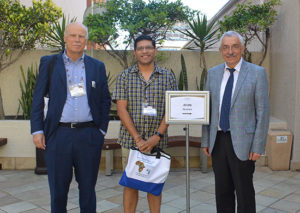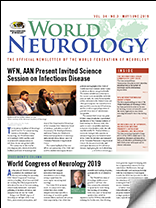WFN and Austrian Neurological Society: Department Visit Program
By Dr. Kalpesh Deraji Jivan
In 2015, I was one of the inaugural recipients of the Austrian Neurology Department Observership Program facilitated by the World Federation of Neurology (WFN) and the Austrian Neurological Society.

Left to right: Prof. Wolfgang Grisold, Dr. Dera Jivan, and Prof. Erich Schmutzhard.
I spent one month in the neurology intensive care unit at Innsbruck Medical University under the supervision of Dr. Bettina Pfausler and Prof. Erich Schmutzhard. During that month, I also met with Prof. Wolfgang Grisold in Vienna.
Recently, I attended the Neurological Association of South Africa (NASA) 2019 Congress held in East London in the Eastern Cape province of South Africa from Feb. 26-March 1, 2019. This was a joint congress held with the African Academy of Neurology (AFAN) Second Congress. Profs. Schmutzhard and Grisold were present at the meeting representing the WFN and European Academy of Neurology (EAN) education committees. They were both invited speakers at the meeting. It was an absolute delight to once again meet them. They were interested to know how the observership assisted me and urged me to write a brief follow-up report.
Four years have passed, and I am still a consultant in the neurology department at the University of the Witwatersrand. The staff of this department services four academic hospitals in Johannesburg. Four years on, and public health care in South Africa is still severely underresourced.
There have been times when basic equipment is not available; equipment such as lumbar puncture manometry sets. In fact, for a few weeks earlier this year, our hospital had no intravenous anti-epileptics. Four years on, and there are still no specialised neuro-ICUs in South Africa. Critical care for patients with acute neurological illnesses still remains in the domain of our pulmonologists and anaesthetist. Does this mean my observership was a waste of time?
Certainly not! While in Insbruck, Prof. Schmutzhard recommended that I look at their acute stroke ward. The ever-helpful Dr. Pfausler obliged and introduced me to the acute stroke unit. I was shown their approach to the management of acute strokes; their unit boasting a world-class door to needle time. I have since implemented some of these strategies at our neurology unit. Although we do not have a formal acute stroke ward, we have certainly thrombolyzed more patients in the past four years and have reduced our door-to-needle time.
The point is that nothing goes in vain. I have bettered my neurological career. Were it not for the generosity of the Austrian Neurological Society, I would not be the neurologist I am today. I would definitely advise all young neurologists in low-income countries to apply for these department visits to empower themselves, their departments, and enhance the care for their patients. •
